Holy Father, thank you for honoring pioneers of Korea's Church
A wave of persecutions in the 18th and 19th centuries took the lives of almost 10,000 Catholic followers, considered to be in opposition to the social system of the late Joseon Kingdom (1392-1910). Freedom of religion was granted to Korea's Catholic Church in April 1888, but before that, early church pioneers were subject to brutal oppression. Pope Francis will be recalling their sacrifices and lift them one step closer to sainthood in a historic beatification ceremony in the heart of Seoul, Saturday. It is the first time that Korea's martyrs are being recognized by the Vatican in 30 years since the 1984 papal visit of Pope John Paul II, when he canonized 103 martyrs, including Korea's first priest Andrew Kim Tae-gon. This is a momentous occasion for Korea's Church, which first started in 1997 a meticulous process of getting Vatican's approval for the beatification of Paul Yun Ji-chung and 123 martyrs persecuted more than 200 years ago. These were the earliest pioneers in Korea's Catholic Church in the late 18th and 19th centuries that laid the foundation for a religion that enjoys considerable respect and popularity in today's Korea. Besides encouraging young Catholics across Asia, the pontiff's primary purpose for making a first papal visit to the continent in 15 years is the beatification Mass taking place at Gwanghwamun square. Pope Francis made it clear, during a speech to Korean bishops on the first day of his Korea trip, that he was here to remember the early pioneers of what has become one of the most vibrant Church in Asia. "The beatification of Paul Yun Ji-chung and his companions is an occasion for us to thank the Lord, who from the seeds sown by the martyrs has brought forth an abundant harvest of grace in this land," said the first Jesuit pontiff. "You are the children of the martyrs, heirs to their heroic witness of faith in Christ. You are also heirs to an impressive tradition which began, and largely grew, through the fidelity, perseverance and work of generations of lay persons." Beatification (from Latin beatus, "blessed" and facere, "to make") is a recognition accorded by the Catholic Church of a dead person's entrance into Heaven. Beatification is the third of the four steps in the canonization (pronouncement of sainthood) process. A person who is beatified is in English given the title "Blessed." The Gwanhwamun open-air Mass for the martyrs is expected to be one of the largest religious events in the history of the nation, with more than 20,000 expected in the audience. The entire world will catch the ceremony live from their TVs and on the Internet. "It is extremely rare for the Pope to conduct such a ceremony outside the Vatican," said Bishop Yoo Gyeong-chon of a local committee organizing the papal visit. "It is an occasion to remember their spirit, faith and lives." First-generation martyrs During the Mass, the Pope Francis is recognizing the very first generation of Korea Church founders. The oldest among the list of 124 martyrs is Pius Kim Jin-hu, the great grandfather of Korea's first priest. There are 24 women and 100 men. Many of them are from Seoul and Chungcheong provinces. The youngest of the martyrs is Anastasia Yi Bong-geum, who was only 12 at the time of her execution in 1839. Cardinal Andrew Yeom Soo-jung paid tribute to her ahead of the papal visit. "Among the list of the martyrs that the Holy Father will beatify in Seoul, there is a 12-year-old girl." said Yeom a press center in Seoul, Wednesday. "Korea is the land of martyrs who gave their lives for God. We hope the Korea Church can inspire others on the occasion of the Holy Father's visit." The oldest martyr is Pius Kim Jin-hu, who was 75 at the time of his death. He was born in Solmoe, Myeoncheon, located in the middle of the Naepo plain of South Chungcheong Province. He was the great-grandfather of St. Andrew Kim Dae-geon, and the father of Andrew Kim Jong-han who was martyred in 1816. Most of the martyrs were lay people. There is one Chinese national, Father James Zhou Wen-mo from Jiang-nan Province, China. He was one of the first foreign missionaries in Korea. Before his execution, he told the persecutors: "The only reason I came to Korea, despite the dangers I may face, was because I love the Korean people. The teaching of Jesus is not evil." Pope Francis has praised the past and future of the Korea Church, highlighting its expansion in membership and missionary work. "The Church in Korea is esteemed for its role in the spiritual and cultural life of the nation and its strong missionary impulse. From being a land of mission, yours has now become a land of missionaries; and the universal Church continues to benefit from the many priests and religious whom you have sent forth." The Korean clergy has gained more recognition in the Vatican over the years. In 1969, Cardinal Stephen Kim Sou-hwan was named the youngest cardinal in history at age 47. Until his death in 2009, he was the face of the Korean Church and enjoyed much respect in Korean society. Although not a dominantly Catholic country like the Philippines, Korea is one of the few Asian countries that has seen significant growth in the number of believers in recent years. The nation's Catholic population has increased its membership by 70 percent in the past ten years. In 2005, almost 30 percent of Koreans identified themselves as Christian. Most are Protestants, but Catholics are the fastest growing group with around 5.3 million followers -- 10.3 percent of the population. The Korean Church is respected for its unique history in the 2,000-year old Catholic faith. Unlike other countries where missionary priests spread the faith, the nation's church is homegrown. The Church in Korea survived without any formal missionary priests until clergy from France (the Paris Foreign Missions Society) arrived in 1836 for the ministry. ''The Gospel in Korea wasn't brought by conquerors or missionaries,'' said Cardinal Pietro Parolin, the Vatican Secretary of State in the introduction of the book ''Young People and Martyrs in Asia: Pope Francis' Mission in Korea." "This is valid for other Asian countries, where the Christian faith often finds trouble and obstacles and is still seen as a foreign faith.'' The history of Catholicism in Korea began in 1784 when Yi Seung-hun was baptized while in China under the Christian name of Peter. He later returned home with various religious texts and baptized many of his fellow countrymen.
|
Saturday, August 16, 2014
Holy Father, thank you for honoring pioneers of Korea's Church
About 25 pct of military conscripts suffer from depression: study
Close to 25 percent of South Korea's military conscripts suffer from depression, some of them pushed to their limits from insults and isolated environments at barracks, a study showed Sunday.
The study conducted in 2012 by Kim Sun-young, a nursing major at Seoul National University graduate school, showed that nearly 25 percent of the 288 conscripts she surveyed were suffering from depression, while 17.4 percent complained of obsessive compulsive disorder.
Frequent derogatory insults and difficulties in reporting or revealing superiors' bullying were cited as the main reasons why conscripts often fall into depression, according to the paper.
The study results gained weight after the country's military, which runs under mandatory conscription, deals with the aftermath of the death of a 23-year-old private first class who died after weeks of beatings and abuse by his superiors.
Three conscripts recently killed themselves after complaining of insults. A sergeant who was bullied went on a shooting rampage at another front-line guard post in June.
The study emphasized the importance of support from management-level officers as well as increased feelings of self-efficacy.
"The survey showed correlation between psychological health and accidents inside the military ... and what is needed is treating conscripts with respect," it said. (Yonhap)
The study conducted in 2012 by Kim Sun-young, a nursing major at Seoul National University graduate school, showed that nearly 25 percent of the 288 conscripts she surveyed were suffering from depression, while 17.4 percent complained of obsessive compulsive disorder.
Frequent derogatory insults and difficulties in reporting or revealing superiors' bullying were cited as the main reasons why conscripts often fall into depression, according to the paper.
The study results gained weight after the country's military, which runs under mandatory conscription, deals with the aftermath of the death of a 23-year-old private first class who died after weeks of beatings and abuse by his superiors.
Three conscripts recently killed themselves after complaining of insults. A sergeant who was bullied went on a shooting rampage at another front-line guard post in June.
The study emphasized the importance of support from management-level officers as well as increased feelings of self-efficacy.
"The survey showed correlation between psychological health and accidents inside the military ... and what is needed is treating conscripts with respect," it said. (Yonhap)
Papal Visit That Thrills Catholics Is Unsettling to Protestants in South Korea
SEOUL, South Korea — In a symbolic moment for the Vatican and South Korea’s 5.1 million Catholics, hundreds of thousands of people cheered as Pope Francis rode through central Seoul on Saturday to lead a Mass to beatify 124 martyrs directly in front of the palace of the old Korean dynasty that killed them more than a century ago.
“It feels like my heart is bursting,” said Yoon Ji-hyang, 45, between screams, as she jumped up and down to get a glimpse of the pope as Francis, waving and smiling, passed by on the city’s main boulevard.
Since the pope’s arrival Thursday, his visits to a center for handicapped children and his common-man touch have generated front-page news lavishing praise for his humility, which has been celebrated elsewhere. One news agency headlined its report: “Let’s Meet the Pope, ‘The Friend of the Poor,’ ” while the national public broadcaster gushed about his willingness to pose for cellphone pictures with ordinary Koreans.
But not everyone in South Korea has welcomed the pope, who is on a five-day visit meant to acknowledge Asia’s growing importance to the Catholic Church. And it is not Buddhists or Confucians — the country’s two major non-Christian religious groups — who are publicly expressing unhappiness with his visit, but members of Protestant groups who fear Catholic encroachment in a country where Christians make up 29 percent of the population.

“The enemy king has appeared at the center of our nation!” the Rev. Song Choon-gil, a Presbyterian pastor, shouted during a rally of hundreds of Protestants who gathered a few blocks from the papal Mass on Saturday. Accompanied by a band, the evangelical Protestants sang hymns and danced, shouting that they were sounding “the trumpets of spiritual war” against the “idol worship” and “satanic forces” they said Roman Catholicism represents.
Although tensions between South Korea’s Catholics and Protestants are not new, the pope’s visit has brought into focus the often ugly rivalry between churches vying for hearts and souls in South Korea. It also comes as the country is still reeling from accusations by prosecutors that the pastor of a relatively small Christian church siphoned money from the company whose ferry sank in April, killing more than 200 teenagers.
The broader Protestant community has officially welcomed Francis’s visit, the first by a pope to the country in 25 years, and the pope planned to meet the country’s religious leaders on Monday to promote harmony among different faiths. But even many mainstream Protestants feel unsettled by the trip, which comes as some denominations are suffering image problems and stagnating membership after decades of explosive growth.
“What is interesting is that there is very little mention of the pope’s visit to Korea in Protestant media, even though it is the biggest news in the country right now,” said Koo Se-woong, an expert on Korean religions. “That silence itself speaks to the resentment Protestants feel toward the Catholic Church, which enjoys a greater level of public trust than the Protestant side.”
Catholics first brought Christianity to Korea more than two centuries ago. But Protestant churches pursued aggressive evangelism, especially in the 1970s and 1980s when they reached out to the millions of people who migrated to cities during a period of rapid industrialization. The country is now home to some of the largest megachurches in the world, all of them Protestant, including Yoido Full Gospel Church in Seoul, the world’s largest, with a congregation of more than 800,000.
Competitive proselytizing, however, also created some of the problems now dogging South Korea’s Protestant churches. Some non-Christians are offended by Protestants who seek converts on Seoul’s streets and subways, sometimes shouting through megaphones that nonbelievers will be relegated to hell.
In 2007, Protestants’ evangelizing zeal was criticized after young Presbyterian missionaries from South Korea were kidnapped by the Taliban in Afghanistan, raising questions about whether church leaders had been reckless in sending them there.
Competition for believers has also increased in recent years with a proliferation of small Protestant churches. South Korea has long been open to the creation of new churches that share some beliefs of other Christian groups but are also shaped by the personal beliefs of their founders. Many of the churches are affiliated with major denominations but are so small they are squeezed into buildings crowded with restaurants, hair salons and bars.
Some, however, are more controversial and have no official connection to other denominations. While the Rev. Sun Myung Moon’s Unification Church is now more accepted in South Korea despite its highly publicized mass weddings, some of the newer groups have been labeled “cults” for their unique interpretations of the Bible and for the notoriety of their leaders.
The head of one such church is serving a 10-year prison term after persuading women to have sex with him in the belief that it would save their souls.
And more recently, many South Koreans were angered by the news about the church leader with ties to the ferry company. The man, Yoo Byung-eun,who was found dead in June while on the run from the police, was both a co-founder of his church and the head of a business empire, according to prosecutors, who say he and his family were enriching themselves even as they scrimped on safety measures for the ferry.
Mainstream Protestant churches have also suffered financial scandals in recent years as some preachers have been accused of misusing church funds to build their family’s fortunes.
Such scandals are thought to have contributed to troubling news for Protestants: In a widely cited annual survey conducted in December by the Christian Ethics Movement of Korea, South Koreans selected Catholicism as the most trustworthy religion, followed by Buddhism and then Protestantism.
“Unlike other major religious organizations that have suffered numerous financial and sexual scandals over the years, the Catholic Church in South Korea has proven to be remarkably clean,” Mr. Koo said. “So I am not surprised that the South Korean Catholic Church, with its strong moral authority, is enjoying a resurgence in the age of moral vacuum, while Protestant churches have stagnated, plagued by the perception of moral decrepitude and obsession with building megachurches.”
The Catholic Church has suffered its own problems, mainly criticism that it has focused less attention on the poor in a country already troubled by a growing wealth gap.
Still, the church is more often associated with the downtrodden than are Protestant groups, which generally embrace capitalism wholeheartedly and are aligned with some of the country’s wealthiest citizens and most powerful political leaders. That alliance was especially pronounced under the former president, Lee Myung-bak, a Presbyterian elder and a former business leader; when he was the mayor of Seoul, he vowed to “consecrate” the capital to the Christian god. Catholic leaders, on the other hand, often played a visible role in left-leaning causes, some of which resonated with a public that is generally enthusiastic about capitalism but increasingly concerned about social inequality.
Choo Chin-woo, a local newsmagazine reporter who has specialized in covering the country’s churches, said Francis’s comments expressing concern for the poor and his criticism of capitalist greed had made clear the difference between the pope and the Korean leadership of both Protestant and Catholic churches.
“In the standard of the mainstream Korean churches today,” Mr. Choo said, “the pope is clearly a ‘commie.’ ”
[Papal Visit] Downtown Seoul becomes outdoor cathedral
[Papal Visit] Downtown Seoul becomes outdoor cathedral

Published : 2014-08-16 14:42
Updated : 2014-08-16 17:23
Updated : 2014-08-16 17:23
 |
| (Yonhap) |
Hundreds of thousands of people flocked to witness Pope Francis beatify 124 martyrs in downtown Seoul on Saturday under chants of “amen” and “viva il papa.”
Up to 1 million people, according to the police, gathered in Seoul’s Gwanghwamun Square -- usually a district bustling with office workers.
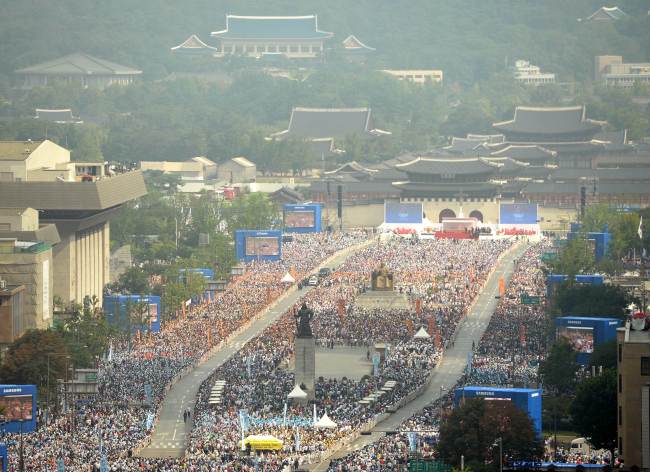 |
| (Yonhap) |
The square resembled a large outdoor cathedral on Saturday with attendees praying in silence and singing Bible hymns during the beatification ceremony.
 |
| (Yonhap) |
The crowd enthusiastically waved to the pontiff, as he paraded down in an open-sided car the streets of Gwanghwamun for about 30 minutes. The Catholic Church’s top cleric smiled in return, stopping several times to kiss and bless babies.
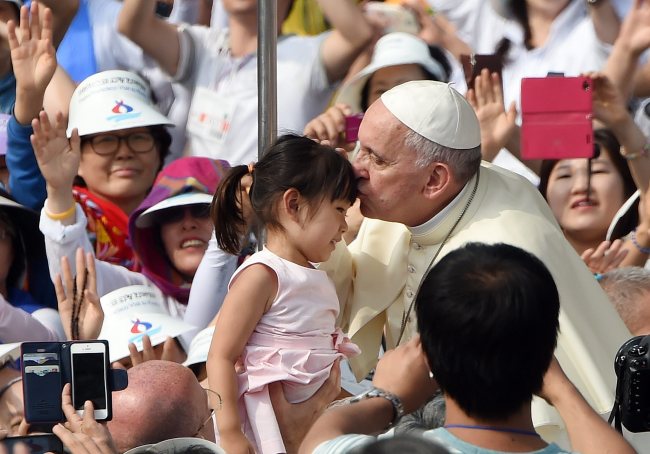 |
| (Yonhap) |
He got off the vehicle when he saw family members of victims of April’s ferry sinking who have been camping out in the area for weeks for a full investigation into the tragedy that claimed around 300 lives. He personally consoled them.
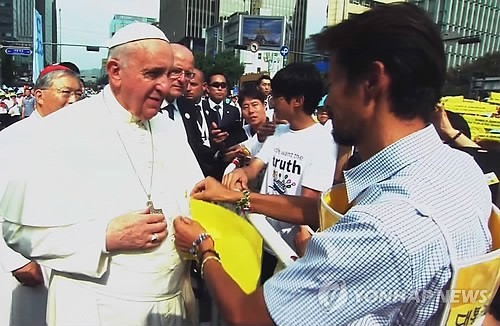 |
| (Yonhap) |
Law enforcement officials and emergency medical technicians stood watching, to ensure security and safety.
 |
| (Yonhap) |
“Sir, you need to get off that tree,” a police officer told one onlooker climbing up to get a better glimpse of the pope.
 |
| (Yonhap) |
Temperatures reached 27 degrees Celsius. A few were reported to have suffered minor heat injuries, with most of the onlookers sitting directly under the morning sun. Some were sent to provisional tents for treatment. Patients could be seen lying on makeshift bunks in some of the air-conditioned emergency tents.
“Actually there were quite a lot (of patients),” one paramedic on the scene said. “Most of them complained of dizziness and fatigue, probably because of the heat.”
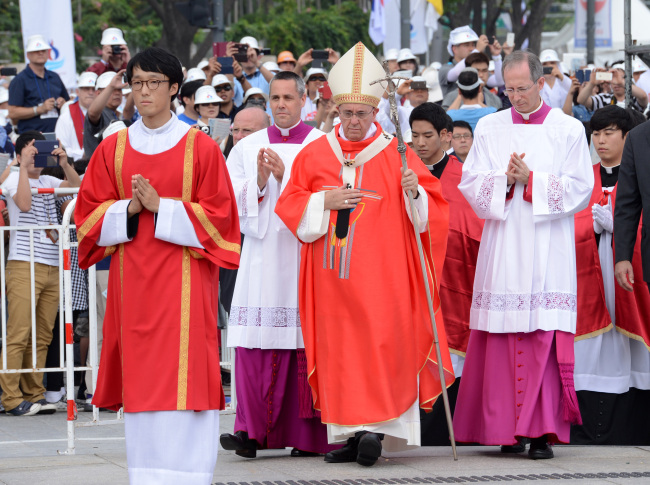 |
| (Yonhap) |
Pope Francis beatified 124 martyrs executed in the 18th and 19th centuries by government officials of the Joseon period (1392-1910). The Joseon dynasty was Korea’s ruling royal family until 1910 when Japan annexed Korea. Officials of the period did not tolerate Catholicism, fearing the religion could invite unwanted western political influence to Korea.
By Jeong Hunny (hj257@heraldcorp.com)
Thursday, August 14, 2014
Pope picks Kia Soul as Korea limo
Pope Francis, known for his sincerity and frugality, has picked Kia Motors’ Soul compact car as his limo throughout his planned five-day visit to South Korea from Thursday.
According to the preparatory committee on Wednesday, the head of the Roman Catholic Church initially asked to ride in the “smallest car in Korea” during his first papal trip to Asia.
Upon his request, several compacts such as Kia Motors’ Morning and Ray and GM Korea’s Chevrolet Spark were cited as possible candidates for the Popemobile.
But due to safety issues, the Seoul committee said the pope’s final choice was the Kia Soul, which is slightly bigger than most compact cars at 1,600 cc. The starting sticker price of the Soul stands at 14.5 million won ($14,100).
“It hurts me when I see a priest or nun with the latest-model car. You can’t do this,” the pope said earlier in an interview. “A car is necessary to do a lot of work, but, please, choose a more humble one.”
As his comments suggest, choosing the Soul appeared to be a reflection of the pope’s thrifty lifestyle.
Since an assassination attempt on Pope John Paul II in 1981, the head of the Roman Catholic Church has used the custom-made, bullet-proof Popemobile.
Despite such risks, Pope Francis has preferred an open-topped vehicle for tours through crowds in St. Peter’s Square.
In his first visit to Brazil last year, he made his way from the international airport to downtown Rio in a modest motorcade, riding in a compact Fiat with the window open.
Unlike his predecessor, Pope Benedict, who used to ride in a BMW X5 or a Mercedes, Francis’ commuting limo in the Vatican is also a compact sedan, the Ford Focus.
Even though Kia officials in Seoul seem to welcome the Soul being the Popemobile, they declined to comment on the issue due to the sensitivity of the first papal visit to Korea in 25 years.
“We have not been informed on the trim or color of the car that the pope will ride in,” said a Kia official. “We also want to make it clear that we have no plans to use the holy occasion as a marketing opportunity. It wouldn’t be right.”
Industry watchers, however, predicted that Kia, an affiliate of Hyundai Motor, would indeed have the chance to raise its brand awareness during his visit as the pope’s tours to Korean cities would be broadcasted globally through the international media.
Contrary to lukewarm domestic sales, the Kia Soul is enjoying much popularity in overseas markets.
In the first half of this year when the car sold 2,300 units on its home turf, it sold 75,000 in the United States, 4,400 in Europe and 2,800 in South America.
By Lee Ji-yoon (jylee@heraldcorp.com)
According to the preparatory committee on Wednesday, the head of the Roman Catholic Church initially asked to ride in the “smallest car in Korea” during his first papal trip to Asia.
Upon his request, several compacts such as Kia Motors’ Morning and Ray and GM Korea’s Chevrolet Spark were cited as possible candidates for the Popemobile.
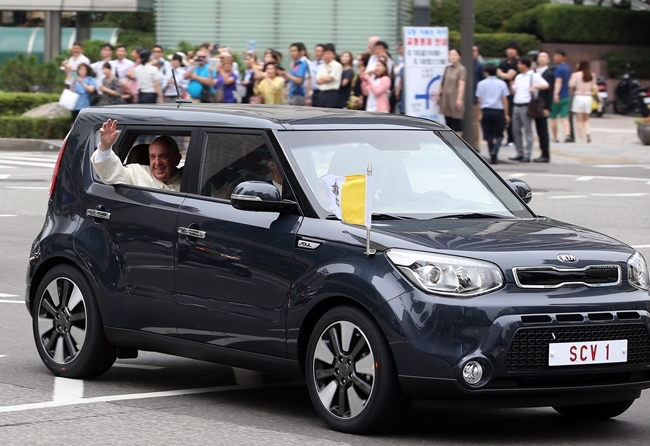 |
| (Yonhap) |
“It hurts me when I see a priest or nun with the latest-model car. You can’t do this,” the pope said earlier in an interview. “A car is necessary to do a lot of work, but, please, choose a more humble one.”
As his comments suggest, choosing the Soul appeared to be a reflection of the pope’s thrifty lifestyle.
Since an assassination attempt on Pope John Paul II in 1981, the head of the Roman Catholic Church has used the custom-made, bullet-proof Popemobile.
Despite such risks, Pope Francis has preferred an open-topped vehicle for tours through crowds in St. Peter’s Square.
In his first visit to Brazil last year, he made his way from the international airport to downtown Rio in a modest motorcade, riding in a compact Fiat with the window open.
Unlike his predecessor, Pope Benedict, who used to ride in a BMW X5 or a Mercedes, Francis’ commuting limo in the Vatican is also a compact sedan, the Ford Focus.
Even though Kia officials in Seoul seem to welcome the Soul being the Popemobile, they declined to comment on the issue due to the sensitivity of the first papal visit to Korea in 25 years.
“We have not been informed on the trim or color of the car that the pope will ride in,” said a Kia official. “We also want to make it clear that we have no plans to use the holy occasion as a marketing opportunity. It wouldn’t be right.”
Industry watchers, however, predicted that Kia, an affiliate of Hyundai Motor, would indeed have the chance to raise its brand awareness during his visit as the pope’s tours to Korean cities would be broadcasted globally through the international media.
Contrary to lukewarm domestic sales, the Kia Soul is enjoying much popularity in overseas markets.
In the first half of this year when the car sold 2,300 units on its home turf, it sold 75,000 in the United States, 4,400 in Europe and 2,800 in South America.
By Lee Ji-yoon (jylee@heraldcorp.com)
[Papal Visit] Pope meets Korea ferry disaster relatives at public mass
Pope Francis met relatives of South Korea's ferry disaster Friday as 45,000 ecstatic people packed into a sports stadium for a mass on the first papal trip to Asia in 15 years.
It was the pope's first public appearance following his arrival in Seoul on Thursday, which nuclear-armed North Korea marked by firing a series of short-range rockets into the sea.
On Friday the North's state media said leader Kim Jong-Un had personally supervised the test of a precision tactical missile.
The report made no mention of the pontiff's five-day visit to the South and stressed that the test was timed to mark the anniversary Friday of the Korean peninsula's liberation from Japanese colonial rule.
A capacity crowd of 45,000 had crammed the World Cup stadium in Daejeon, some 160 kilometers (100 miles) south of Seoul, hours before the pope arrived to conduct the mass.
It was the pope's first public appearance following his arrival in Seoul on Thursday, which nuclear-armed North Korea marked by firing a series of short-range rockets into the sea.
On Friday the North's state media said leader Kim Jong-Un had personally supervised the test of a precision tactical missile.
The report made no mention of the pontiff's five-day visit to the South and stressed that the test was timed to mark the anniversary Friday of the Korean peninsula's liberation from Japanese colonial rule.
A capacity crowd of 45,000 had crammed the World Cup stadium in Daejeon, some 160 kilometers (100 miles) south of Seoul, hours before the pope arrived to conduct the mass.
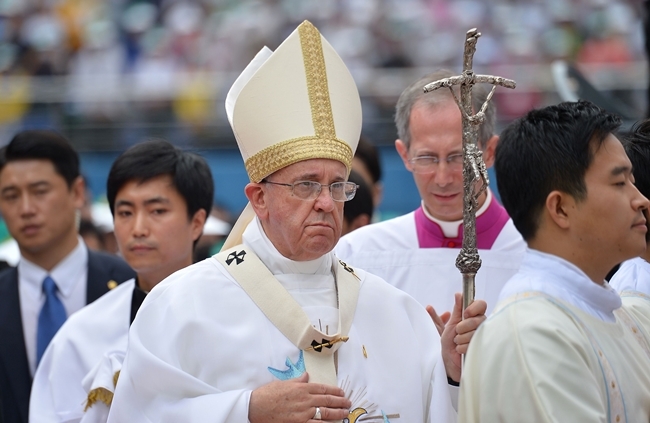 |
| Pope Francis takes part in a mass in front of thousands of followers at Daejeon World Cup Stadium on Friday. (Yonhap) |
Among them were 38 survivors and relatives of victims of April's Sewol ferry tragedy in which 300 people died, most of them schoolchildren.
"I'm a Protestant but I believe the papal visit will help heal the wounds from the Sewol disaster," one of the family members, Kim Hyeong-Ki, told AFP.
Before beginning the mass, Francis held a brief private audience with some of the relatives, who handed him letters urging his support for a full, independent inquiry into the Sewol sinking.
Trees lining the streets leading to the stadium were tied with the yellow ribbons that have become the memorial symbol for those who died.
Thousands without tickets cheered and waved flags as the pope rode to the venue in an open-topped car, stopping from time to time to give a personal blessing to young children and infants held up by their parents.
'Unforgettable' moment
"I think this is the most important and unforgettable moment of my life," said Han Hye-Jin, 26, an office worker in Daejeon.
"I hope the papal visit will help our country overcome sad things like the Sewol disaster and unite together," Han said.
As the pope entered the stadium, the capacity crowd rose, waving white handkerchiefs and shouting "Viva Papa" and "Mansei" ("Long live" in Korean).
The mass was conducted on a raised, canopied stage with giant screens on either side for those high up in the stands, which were decorated with banners in Korean reading "We Will Always Follow you" and "We Love You".
The event coincided with a public holiday to mark the liberation anniversary.
The pope's visit has generated enormous public excitement in a country with a thriving Catholic community that punches well above its minority weight in one of Christianity's most muscular Asian strongholds.
In the last national census to include religious affiliation, conducted in 2005, close to 30 percent of South Koreans identified themselves as Christian, compared to 23 percent who cited the once-dominant Buddhism.
The majority are Protestants, but Catholics are the fastest-growing group, with around 5.3 million adherents -- just over 10 percent of the population.
"It's just wonderful to be able to see him in person," said Helena Sam, 46, a businesswoman in Daejeon.
"I only hope the pope's message of peace and reconciliation will spread to our brothers and Catholic followers in North Korea," she said.
North Korea had been invited to send a group of Catholics to attend a special inter-Korean "reconciliation" mass by Francis in Seoul next week, but declined, citing upcoming South Korea-US military drills.
The North pays lip-service to the freedom of worship but maintains the tightest controls over religious activity and treats unsanctioned acts of devotion as criminal.
The pope's visit is very much aimed at fuelling a new era of growth for the Catholic church in Asia and Francis will get a chance to send a message to the region later Friday when he meets several thousand young Catholics gathered in Daejeon for Asian Youth Day. (AFP)
Subscribe to:
Comments (Atom)








